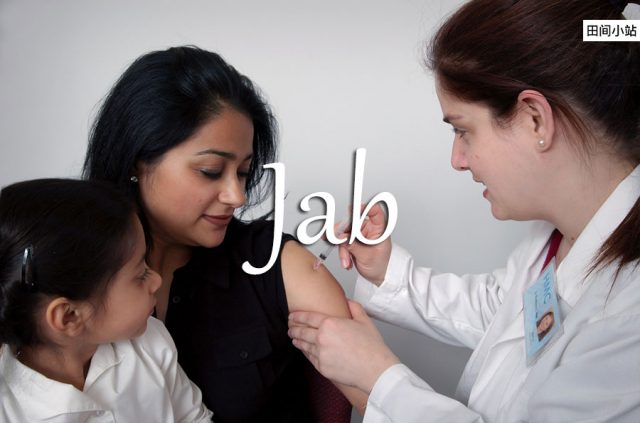本文经授权转载自微信公众号:田间小站

TEM8
外刊例句
- In contrast Germany has administered merely 317,000 jabs, or 0.4% of its people.
相比之下,德国仅进行了31.7万次接种,占其人口的0.4%。
——《经济学人》 - When Mr. Basuki landed a jab at an opponent who had accused him of disrespecting Islam, the family let out a cheer.
当对手指责钟万学(Basuki Purnama)不尊重伊斯兰教,遭他反唇相讥时,全家人发出了欢呼。
——《纽约时报》
基本释义
[verb] poke (someone or something) roughly or quickly, especially with something sharp or pointed
[动词] (尤指用尖锐的东西)粗暴地或迅速地戳(某人或某物)
深入解读
Jab 是一个与熟词 job 十分形似的单词,也是一个近期在《经济学人》中出现比较多的单词,用的是其在英式英语中的非正式含义“注射接种、预防针”,比如:
- 流感预防针
flu jabs/shots
而其基本含义“戳、刺、捅”则源自中古英语 jobben (戳、刺、啄),多指突然快速用力地将细的或锋利的物体戳进另一个物体,既可以作动词也可以作名词使用,比如:
- 当心!你的雨伞快戳到我眼睛了!还有小心别让铁丝网钩破衣服。
Watch out! You nearly jabbed me in the eye with your umbrella! And be careful not to snag your coat on the barbed wire. - 她老是抱怨那个贱妇是如何不把她放在眼里的。我想这就是她用胳膊肘猛顶那个贱妇的肚子的原因。
She's always grousing about how she's been treated by the tramp like dirt. I think that's why she gave the tramp a jab in the stomach with her elbow.
除了胳膊肘顶肚子外, jab 在打人方面还可以用来表示用拳击时用拳“猛击”,比如:
- 对对手而言,那个身材高大的女人实在是太强大了,一顿结实的左刺拳打得对手摇摇晃晃。
The hefty woman was simply too powerful for her opponent, rocking her with a steady supply of left jabs.
有道是“sometimes words hurt more than swords”,言语上的攻击常常比胳膊肘顶肚子或者猛击一拳更让人感到刺痛,而这也可以用 jab 引申表示“抨击、攻击、刺激、刺痛”,多指一种突然而不愉快的批评,比如:
- 他们一直在互相指责,其中民主党一方抨击总统的一大堆错综复杂的对外政策问题。
They have been sniping at each other, with the Democrats taking jabs at a thicket of foreign policy problems of the president.
名著用例
That jab seemed in something of Rhett's old style and Scarlett grew annoyed.
这是一句带刺儿的话,看来瑞德的老脾气还没有改掉,因此思嘉有点恼火了。
出自美国作家玛格丽特·米切尔(Margaret Mitchell)创作的长篇小说《飘》(Gone with the Wind)。该小说在1937年获得普利策奖,是玛格丽特·米切尔在世时出版的唯一一部作品。不但它成为美国史上最为畅销的小说之一,而且由这部小说所改编的同名电影《乱世佳人》也成为影史上不朽的经典。
同近义词
- poke: jab or prod (someone or something), especially with one's finger
- prod: poke (someone) with a finger, foot, or pointed object
- nudge: prod (someone) gently, typically with one's elbow, in order to draw their attention to something
